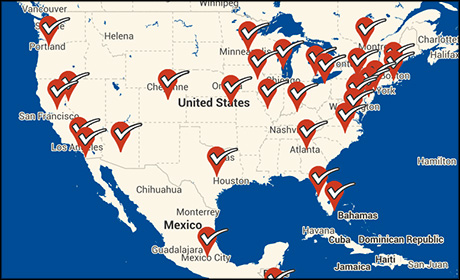
US politicians and their campaign staff have developed a number of tactics to respond to the increase in fact-checking by journalists, according to a new report.
Fact Check This, researched and written by journalist Mark Stencel, reveals how fact-checking reports are becoming "weapons in the political discussion".
"Watching political advertising, it's not hard to imagine that it was potential fodder for campaigns to use a fact-check to read up on their opponent," Stencel told Journalism.co.uk.
"What was most surprising to me was the idea that campaigns and candidates would use those fact-checks in misleading ways to the extent to which they do.
"That they would twist what the fact-checker said and put it in an ad with an attribution to a well-known fact-checking organisation, and say something that was clearly not what the fact-checkers had said."
Fact Check This is the most recent in a series of work commissioned by the American Press Institute's Fact-Checking Project, an initiative to increase and improve fact-checking and accountability journalism.
Stencel, a former managing editor at NPR Digital News, reviewed responses to fact-checking stories in addition to "more than a dozen conversations with people in politics and journalism about how fact-checking has changed their behaviour".
The report also found that political teams designate significant resources to "frame and back up" public statements in advance, to avoid what Republican Jeb Bush refers to as being 'PolitiFacted'. This research and response process is sometimes referred to as "a legal discovery process or "going down the rabbit hole".
Though fact-checking has been a journalistic discipline for many years, it is only relatively recently that it has branched out on its own.
FactCheck.org was launched in 2003 by Brooks Jackson, a former Associated Press, Wall Street Journal and CNN reporter.
PolitiFact, a project operated by the Tampa Bay Times, joined the scene in 2007, and The Washington Post's Fact Checker column became a permanent feature in 2011.
A "fact-checking census" released by the Duke Reporters' Lab in January pinpointed the number of active fact-checking sites around the world at 64, up from 44 active sites in May 2014.
And in the UK, Full Fact has been keeping an eye on public discourse since 2010, successfully crowdfunding a broad fact-checking project for the recent General Election.

An interactive fact-checking map from Duke Reporters' Lab
Despite some interesting technology developments in the area – such as the Knight Lab-funded Super PAC app, designed to detect misleading statements in political ads – Stencel said his passion lies in "less high-tech innovation".
"I think we should be tinkering with the formats of the stories themselves to take advantage of what we've learned about how voters absorb or reject media fact-checking," he explained.
"We should use new technology to think of new story forms, new ways of presenting fact-checks that may be more persuasive and effective with the people they're intended to help serve: the voters."
To read the full report visit americanpressinstitute.org/fact-checking-project.
Free daily newsletter
If you like our news and feature articles, you can sign up to receive our free daily (Mon-Fri) email newsletter (mobile friendly).
Related articles
- Newsrewired takeaways: fact-checking, Gen Z and public interest news in the run-up to the general election
- Building trust during 2024 elections with live-blogging and fact-checking
- New digital platform helps support free press in Sudan
- How do narratives spread, and what does this mean for how we report the news?
- The truth sandwich: how to cover falsehoods from official sources









